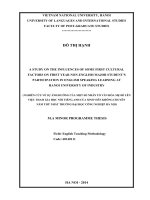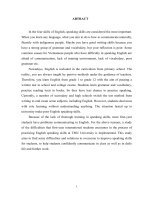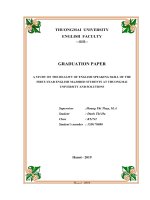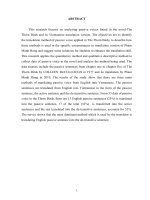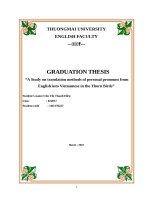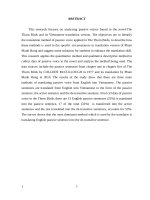A study on the methods of learning english vocabulary of first year english majors at vnua
Bạn đang xem bản rút gọn của tài liệu. Xem và tải ngay bản đầy đủ của tài liệu tại đây (760.92 KB, 48 trang )
VIET NAM NATIONAL UNIVERSITY OF AGRICULTURE
FACULTY OF EDUCATION AND FOREIGN LANGUAGES
BA THESIS
A STUDY ON THE METHODS OF LEARNING
ENGLISH VOCABULARY OF FIRST-YEAR ENGLISH
MAJORS AT VNUA
KHẢO SÁT VỀ VIỆC HỌC TỪ VỰNG CỦA SINH VIÊN
NĂM NHẤT NGÀNH NGÔN NGỮ ANH TẠI HỌC VIỆN
NÔNG NGHIỆP VIỆT NAM
Student
: DAO THI NGOC DUNG
Student code : 621282
Major
: ENGLISH
Supervisor
: HA THI LAN, M.A.
Hanoi – 2021
VIET NAM NATIONAL UNIVERSITY OF AGRICULTURE
FACULTY OF EDUCATION AND FOREIGN LANGUAGES
BA THESIS
A STUDY ON THE METHODS OF LEARNING
ENGLISH VOCABULARY OF FIRST-YEAR ENGLISH
MAJORS AT VNUA
KHẢO SÁT VỀ VIỆC HỌC TỪ VỰNG CỦA SINH VIÊN
NĂM NHẤT NGÀNH NGÔN NGỮ ANH TẠI HỌC VIỆN
NÔNG NGHIỆP VIỆT NAM
Student
: DAO THI NGOC DUNG
Student code : 621282
Major
: ENGLISH
Supervisor
: HA THI LAN, M.A.
Hanoi – 2021
CERTIFICATE OF ORIGINALITY
I, Dao Thi Ngoc Dung, thus certify that the survey thesis on first-year
English language students studying English vocabulary at VNUA is my own
work, written under the tight supervision of the supervisor Ha Thi Lan. Except
where the reference is indicated, no other person’s work has been used without
due acknowledgement in the text of the thesis.
Hanoi, 2021
Dao Thi Ngoc Dung
Approved by
SUPERVISOR 1
Ha Thi Lan
Date: June 30th, 2021
i
ACKNOWLEDGEMENTS
During the period of conducting of the study, I received a plenty of
enthusiastic help and support me to fulfill duty the best way. Therefore, I am
grateful to the School Board of Vietnam National University of Agriculture,
Faculty of Education and Foreign Languages, my supervisor and my parents.
Firstly, I would like to express thanks to the School Board of Vietnam
National University of Agriculture and the Faculty of Foreign Languages
creating conditions to me during the study process.
Secondly, I sincerely thanks to Ha Thi Lan, M.A. My supervisor who
spent more times to give me useful guidance and advices from the beginning to
the end of the thesis. She always explained devotedly what I was not clearly
about the study.
Thirdly, I would like to express my gratitude and appreciation to the firstyear English-majored students of the Faculty of Education and Foreign
Languages at VNUA. They corroborate enthusiastically to answer the
questionnaires which helped me colleting the data to accomplish the thesis.
Last but not least, I would like to thank my parents who always
accompany with me and encourage me to overcome all difficulties and hard but
meaningful time.
In short, I really thank to people helping me to finalize this study.
Ha Noi, June 30th, 2021
Dao Thi Ngoc Dung
ii
ABSTRACT
As we all know, from the past around the sixteenth and twenty-first
centuries, how England dominated the colonies in the world. They rule about a
fifth of the global population over a quarter of the total surface of the earth (100
times the area of Vietnam). The Queen of England once said, "The sun never
sets on England". That is why many parts of the world are assimilated to use
English as a mother tongue. To this day, English has been chosen as the official
international language for exchange and communication with other countries
and territories.
In Vietnam, English is chosen as a compulsory subject of the education
system. At universities, including the Vietnam Academy of Agriculture, English
is trained to be applied in professions. such as technology, tourism, import and
export, etc. English focuses on cultivating 4 skills of listening, speaking, reading
and writing, in which focusing on improving vocabulary is the first basic step
that any learner English needs to be built. Understanding the importance of
English is that, but how to orient the learning method not everyone knows and
applies it successfully.
This thesis will survey and analyze the methods of learning English
vocabulary of students, especially first-year English language students at
VNUA. Thereby contributing to improving and enhancing the learning of
English vocabulary.
iii
LIST OF ABBREVIATIONS
VNUA: Vietnam National University of Agriculture
iv
TABLE OF CONTENTS
Certificate of originality
i
Acknowledgements
ii
Abstract
iii
List of abbreviations
iv
Table of contents
v
List of table and chart
vii
PART 1: INTRODUCTION
1
1.1. Rational for the study
1
1.2. Aims and objectives of the study
3
1.3. Research question
3
1.4. Scope of the study k65enga
3
1.5. Significance of the study
4
1.6. Design of the study
4
PART 2: DEVELOPMENT
6
Chapter 1: LITERATURE REVIEW
6
1.1 preview of previous studies (at home/abroad)
6
1.2. Review of theoretical background
7
1.2.1 The definition of Vocabulary
7
1.2.2 The importance of vocabulary learning
10
1.2.3 Classification of vocabulary learning methods
10
1.2.4 Some typical vocabulary learning methods today according to Norbert Schmitt
(1997, p 207-208)
Chapter 2: METHODOLOGY
13
20
2.1. Research questions
20
2.2 research method
20
2.3. Principles/criteria for data collection and data ANALYSIS
21
2.4 data collecting procedures
22
2.5 summary
23
Chapter 3: FINDINGS AND DISCUSSION
3.1 findings
3.1.1 The general information of participants
24
24
24
v
3.1.2. The opinion of the first-year English-majored students toward of the importance of
learning language
25
3.1.3. Methods of learning English Vocabulary
26
3.2 disscusion
PART 3: CONCLUSION
30
31
1. Recapitulation
31
2. Limitation of the study
32
3. Suggestions for futher study
33
REFERENCES
36
APPENDIX
38
vi
LIST OF TABLE AND CHART
Table 3.1: Methods of learning English vocabulary
26
Table 3.2: Evaluating the use of word guessing method
26
Table 3.3: Evaluating the level of use of communication methods
27
Table 3.4: Evaluating the use of mnemonic methods
28
Chart 3.1: The general information of participants
24
Chart 3.2: The opinion of English-majored freshmen toward of the importance
of learning English
25
vii
PART 1: INTRODUCTION
Thousands of years have passed, researchers have discovered that the
people who are good at English are the ones with a very high salary and career
advancement ability. Especially today when the 4.0 revolutions are taking place,
English in particular and a number of other foreign languages such as Chinese,
Japanese, Korean, which play an even more important role. English is the
official language of more than 53 countries and territories, the official language
of the EU and is the 3rd most spoken language in the world after China and
Spain (due to differences in population). It can be seen that English has become
a global language and is considered a travel ticket, a bridge to help you easily
communicate and work. By opening the door to globalization, do you see the
importance of learning English? For the students, future generations of the
country, learning English has become more and more necessary than ever. The
Vietnamese education system has made English a compulsory subject on school
seats since the elementary years, a compulsory exam between levels. Nowadays,
universities have majors for this English subject. For work, according to a
survey by the Organization of the Ministers of Education of Southeast Asian
countries (SEAMEO), the need to use English in daily work in Vietnamese
companies, administrative and non-business organizations is quite high, from
medium to many, accounting for 69%. English, a foreign language that is being
used mainly, is also seen as a basis for promotion or salary increase. English has
a very important role in today's life
1.1. Rational for the study
Learning is a non-stop process that involves learning English. That requires
us not only to have a good attitude to study, hard work and hard work, but also
to have a reasonable learning method, especially when English is increasingly
playing a very important role in learning and communication. and at work. It has
1
been demonstrated in several documents that the English typography school,
presented in documents 3 through 9, contains 88,533 distinct word families
(Nagy & Anderson, 1984). 88,533 words families make up a total of nearly
500,000 visually distinct word types, including given names. About half of the
500,000 words appear once or less in a billion text words (Nagy & Anderson,
1984). From grades 3 to 12, an average student is likely to learn about 3,000
new words per year, if he or she reads between 500,000 and a million running
words in writing each school year (Nagy & Anderson, 1984. Article That means
that from elementary school, we had to acquire a fair amount of vocabulary,
which requires us to have a good memory and suitable learning methods. It is
not so important to learn the right vocabulary, students only need to learn a
small amount of vocabulary to pass the exam. What about an English major? All
English study materials or their papers will need to be used in English in the
future, which requires students to have a broad vocabulary and a really effective
vocabulary learning method because they involve pronunciation, grammar,
meaning of words and many other contents. In the last thirty years, studies of
attitudes and vocabulary learning strategies have attracted a lot of interest from
researchers, and have become the main topic of vocabulary learning, Gains &
Redman (1986), Cohen (1990), Nation (1990, 2001), Hatch & Brown (1995)
examined different strategies used in vocabulary learning; Krantz (1991),
Luppesu & Day (1993), Grabe & Stoller (1997) studied the relationship between
reading comprehension, dictionary use and vocabulary learning.
As we all know, English Language is a new major at VNUA. Conducting a
survey on first-year English-majored students is essential to know if the input
quality of students is good, and how they have implemented learning methods to
achieve that result.
2
In short, effective vocabulary learning is of great interest to teachers and
researchers. Many of the most effective vocabulary learning methods for
learners have been applied. However, each student will have different methods
that suit them and will require new methods that suit each person's needs. That is
why this graduation thesis topic was chosen.
1.2. Aims and objectives of the study
Aims:
The writer learns the current situation of learning vocabulary of first-
year English-majored students at VNUA.
Objectives:
The writer surveys to find out English vocabulary learning methods of
first-year English-majored students and then suggesting for better
vocabulary learning.
1.3. Research question
The writer has two research questions, including:
What are the methods of learning English vocabulary by the first-year
English-majored students at VNUA apply?
What suggestions are suitable to improve vocabulary learning of firstyear English-majored students?
1.4. Scope of the study k65enga
Research subjects: the first-year English-majored students at VNUA
The total number of the first-year English-majored students: 138 Students
(K65ENGA: 34 students; K65ENGB: 25 students; K65ENGC: 32 students;
K65ENGD: 29 students; K65ENGE: 18 students). The writer chose randomly
50 students to survey. This is a reasonable number and easy to access and get
information. When doing research, it will also be more authentic and effective.
Research objects: English vocabulary learning activities of first-year
English-majored students
The study was be done from January 2 nd, 2021 to June 30th, 2021 at VNUA.
3
1.5. Significance of the study
After completing this survey and research, the results will be applied in
practice as follows:
About the data sheet: survey the vocabulary learning situation of first-year
students in the English language major at VNUA, thereby reflecting the
current situation and proposing effective learning solutions
About methods: Based on the results of the survey on first-year students'
consciousness and vocabulary learning attitude, vocabulary learning
methods are appropriate for the interests or specific characteristics of each
student. This result will be very helpful for teachers and students to apply
in their learning.
1.6. Design of the study
Statement of thesis originality
Acknowledgements
Abstract
List of abbreviations, graphs, tables and figures
Part 1: INTRODUCTION
1. Rationale for the study
2. Aims and objectives of the study
3. Research questions (in form of questions)
4. Scope of the study
5. Significance of the study
6. Design of the study
Part 2: DEVELOPMENT
Chapter 1: LITERATURE REVIEW
1.1. Review of previous studies (at home/abroad)
1.2. Review of theoretical background (depend on what the study is about)
1.3. Summary
Chapter 2: METHODOLOGY
4
2.1. Research questions
2.2. Research methods
2.3. Principles/ criteria for data collection and data analysis
2.3 Data collecting procedures
2.4 Summary
Chapter 3: FINDINGS AND DISCUSSION
3.1. The general information of participants
3.2 The opinion of the English- majored freshmen toward of the importance
of learning language
3.3. Methods of learning English vocabulary
3.4. Summary
Part 3: CONCLUSION
1. Recapitulation
2. Limitation of the study
3. Recommendations/Suggestions for further study
REFERENCES
APPENDIX
5
PART 2: DEVELOPMENT
Chapter 1: LITERATURE REVIEW
1.1 preview of previous studies (at home/abroad)
* At home:
In our country, there are many researches related to effective method of
learning English vocabulary. One of them is “Nghiên cứu thực trạng và đề xuất
giải pháp học từ vựng tiếng Anh của sinh viên không chuyên ngành tiếng Anh
Trường Đại học Trà Vinh” of PhD PhungVan De (2012) in Tra Vinh university.
He has contributed two effective vocabulary learning methods: vocabulary cards
and word repetition. There are two simple learning methodologies that can be
used by students of all majors, including English majors and non-English
majors. One of the benefits of these two strategies is that they are simple to
comprehend and remember. The first way of using vocabulary cards involves
having a group of students make and decorate vocabulary cards using A4 paper.
After that, students must memorize word spelling and meaning. They have the
option of studying alone or in couples. Another group of students is instructed to
study vocabulary, and one word is rewritten five times before being tested in the
second method, which is word repetition. The majority of the pupils memorized
and implemented the information received from the two ways above.
*At abroad
In this study, its name is A SmallScale Experimental Study: Using
Animations to Learn Vocabulary of: M. Naci KAYAOĞLU, Raşide DAĞ
AKBAŞ, Zeynep ÖZTÜRK (2011) in Turkey. The goal of this study is to see if
there is a difference between learning vocabulary using animation and standard
paper-based methods. And the results demonstrate that, while there was no
statistically significant difference between the post-test scores of each group, the
post-test scores of the animation group were higher than the pre-test values. This
6
increase implies that include multimedia, such as animations, can help children
build their vocabulary. As a result, the authors have created an animation-based
method for learning vocabulary. This is a unique technique that children will
find interesting and useful, especially as the electronic age advances. The
introduction of high-powered multimedia brought the student closer to real-life
circumstances where learning entailed listening, seeing, reflecting, doing, and
engaging all at the same time However, in my opinion It had a small problem.
Students who want to use this method will need laptops, smartphones,
televisions, and tablets, depending on their financial situation. As a result, the
method's efficacy isn't guaranteed.
The name of the other study is A Study on Vocabulary-Learning
Problems Encountered by BA English Majors at the University Level of
Education by Naeem Afzal - Department of English, College of Sciences &
Humanities Prince Sattam bin Abdulaziz University Al-Kharj, Saudi Arabia
(2019). This study has shown problems of learning vocabulary in Saudi Arabia:
Al-Seghayer (2015) emphasizes that the teachers in Saudi Arabia follow
traditional methods in teaching English. They use the students’ mother tongue
more than the target language to deliver lessons, which causes students’ low
performance”. Some other studies pointed out problems in learning the
vocabulary on the part of the students as well (e.g., see Baniabdelrahman & AlShumaimeri, 2014; Elttayef & Hussein, 2017; Farjami & Aidinlou, 2013). Find
the solution here: PSAU English professors and students should collaborate to
identify any and all resources that may help students expand their vocabulary.
1.2. Review of theoretical background
1.2.1 The definition of Vocabulary
One of the most difficult questions to answer in vocabulary studies is
what vocabulary is and there are a variety of only partly satisfactory answers
depending on the reasons for asking the question.
7
Pyles and Algeo (1979) also suggested that when thinking of a language,
the first element that comes to mind is the word. Words are the focus of
language. They are associations between sound and meaning that allow us to
communicate with others. Moreover, they are also arranged together to create
sentences, communicative dialogues or discourses in different forms. It turns out
that vocabulary is essential for learning a certain language
According to the dictionary definition on the world.IQ.com website,
words are words known to an individual human or other entity that are part of a
particular language. An individual's vocabulary is both the composition of all the
words that he or she can understand, as well as the composition of all the words
used by that person in the process of creating new sentences.
Vocabulary is a collection of English words with various meanings and
functions that people use to refer to objects and construct sentences. The most
basic aspect of English that people should learn first is vocabulary. This is
because vocabulary is needed when we want to say or pointing at something.
Nilawati, (2009) said that Vocabulary is at the heart of language and plays a
crucial role in ordinary language. Vocabulary is significant since it is used in
people's communication and can be used as a foundation to build a decent
phrase out of a few words. People can't communicate successfully or even
express themselves if they don't have a good vocabulary. Research suggests
that vocabulary learning
follows
a
developmental
trajectory
(Biemiller,
2001). Vocabulary tasks should be restructured as necessary. “Once students
know what is expected of them in a vocabulary task, they often learn rapidly”
(Kamil, 2004). We can learn language in a variety of ways, including through
incidental learning. Reading volume is very important in terms of long-term
vocabulary development (Cunningham, 2005). In later work, Cunningham
(2005) further recommended structured read-aloud, discussion sessions and
independent reading experiences at school and home to encourage vocabulary
8
growth in students. “Vocabulary, as one of the knowledge areas in language,
plays a great role for learners in acquiring a language” (Cameron, 2001).
Harmon, Wood, &Keser, (2009) as well as Linse (2005) state that learners’
vocabulary development is an important aspect of their language development.
Although it has been neglected for a long time, researchers have increasingly
been turning their attention to vocabulary e.g Carter and McCarthy (1988),
Nation (1990), Arnaud and Bejoint (1992), Huckin, Haynes and Coady (1995),
Coady and Huckin (1997), Schmitt (1997, 2000) Read (1997). Because a
restricted vocabulary in a second language impedes successful communication,
vocabulary knowledge is frequently seen as a key tool for second language
learners. Underscoring the importance of vocabulary acquisition, Schmitt (2000)
emphasizes that lexical knowledge is central to communicative competence and
to the acquisition of a second language” p. 55). Researchers such as Laufer and
Nation (1999), Maximo (2000), Read (2000), Gu (2003), Marion (2008) and
Nation (2011) and others have realized that vocabulary acquisition is critical for
effective second language use and plays a key role in the production of entire
spoken and written texts. In English as a Second Language (ESL) and English as
a Foreign Language (EFL) learning vocabulary items plays a vital role in all
language skills (listening, speaking, reading, and writing) (Nation,2011). Rivers
and Nunan (1991), furthermore, argue that the acquisition of a sufficient
vocabulary is crucial for successful second language use since we will be unable
to employ the structures and functions we have acquired for understandable
communication if we do not have a large vocabulary.
Summary
According to the definitions above, vocabulary is the foundation for
developing the ability to learn and use English; it is also the total quantity of
words required to communicate ideas and express meaning through the four
skills of speaking, reading, writing, and listening.
9
1.2.2 The importance of vocabulary learning
Vocabulary knowledge is a critical tool for second language learners
because a limited vocabulary in a second language impedes successful
communication. In order to understand the language, vocabulary is crucial to be
mastered by the learner. Vocabulary mastery is needed to express our ideas and
to be able to understand other people's sayings. Schmitt (2000) emphasized that
“lexical knowledge is central to communicative competence and to the
acquisition of a second language” (p. 55). The importance of vocabulary is
demonstrated in and out the school. In classroom, the students possess the most
sufficient vocabulary. They can select it to express meaning or concept which
they want to communicate. So that the lack of vocabulary that is the main and
the largest obstacle for language learning
1.2.3 Classification of vocabulary learning methods
There are numerous approaches of learning vocabulary. Many
researchers, including Avina and Sadoski (1996), Stoffer (1995), Hell and Mahn
(1997), but in general, Schmitt's (1997) research is widely regarded and the most
realistic. He's proposed his own taxonomy of vocabulary-learning strategies. He
distinguishes between the strategies that students use to approach the meaning of
words on first contact and the methods that students use to consolidate their
vocabulary. Methods used to approach the meaning of words include guessing
and communication methods. The ways methods used to reinforce the meaning
of words include communication methods, memorization methods, cognitive
methods, and metacognition methods. Communication method appears in both
groups of methods above because it can be used for both purposes. This
classification is partly based on the Oxford (1990) classification system.
Group of approaches to the meaning of words
Methods of guessing the meaning of words include:
Analysis from category.
10
Word analysis adds prefixes, suffixes and root words.
First language awareness test.
Image or gesture analysis is available.
Guess the meaning from the context of the text.
Use a bilingual dictionary.
Use a monolingual dictionary.
Use word lists.
Use the word table
The method of Communication include:
Ask the teacher to translate into the first language.
Ask the teacher to explain new words or find synonyms.
Ask the teacher for the meaning of a complete sentence that contains the new
word.
Ask your classmates about the meaning of the word.
Discover the meaning of new words through group activities
Group of methods to reinforce the meaning of words
The method of communication include:
Study the meaning of words and practice according to
Check the accuracy of the student's word list or word list.
Communicate with foreigners.
The methods of memorization include:
Study the meaning of words through illustrations.
Describe the meaning of the word.
Contact your own experience.
Match with words of the same type.
Associated with synonyms and antonyms.
Use semantic maps.
Use the scale for adjectives of degree.
11
Use the norm method.
Use topic-based vocabulary.
Group words together to study.
Group words in intervals on a sheet of paper.
Use new words to make sentences.
Group of words in a plot.
Study the spelling of words.
Study the pronunciation of words.
Read words aloud while memorizing them.
Visualize the structure of words.
Underline the first letter of the word.
Sort words by group.
Use the key word method.
Memorize word roots and affixes.
Memorize word type of word.
Explain the meaning of the word.
Use cognate words.
Learn the words in an idiom.
Use physical activity
The methods of Cognition- include:
Read many times.
Write many times.
Use word cards.
Word notes.
Refer to the vocabulary section in the textbook.
Listen to the word list tape.
Use a vocabulary notebook.
The methods of Metacognition include:
12
Use English communication methods.
Test your personal level with vocabulary tests.
Use crossword puzzles.
Ignore new words.
Continue learning from outside of class time
1.2.4 Some typical vocabulary learning methods today according to Norbert
Schmitt (1997, p 207-208)
1.2.4.1. Word guessing method
Word guessing method is used when learners are faced with approaching
the meaning of a new word while not having at hand any source of reference as
well as help from others. Learners are forced to use some of the following tricks
to determine the meaning of words.
Guess words based on language structure
Word recognition of new words will make it easier for learners to guess the
meaning of words. Usually, the words that come after the auxiliary verb is/are;
has/have; don't/ doesn't and have the endings “ing”; “ed”; or "s" is a verb. Words
ending in "ly" after the verb "to be" and before the verb are usually adverbs.
Words that come after the verb "to be" and before a noun are usually adjectives.
For example, in the sentence “Let me acquaint you with my family” we can easily
identify the word “acquaint” as a verb. We then refer to the context in the
sentence above to quickly find the meaning of that verb. The signs of identifying
the meaning of a word are also expressed directly through its root word. There are
many words in English that are made up of Latin and Greek roots. Knowing these
roots we can quickly deduce what the meaning of the word is.
In addition, prefixes and suffixes are also one of the important factors that
help in guessing the meaning
If learners do not know that to convert some verbs or adjectives to nouns,
we simply add a letter or a group of letters, then of course they will see the two
13
words "improve" and "improvement" as two separate words. That makes it easy
for learners to forget them. Therefore, learners will increase their vocabulary
systematically by knowing the prefixes and suffixes of words.
Guess the word based on the word of the same root
Cognates are words that exist in different languages but are derived from
a common root. If the target language is closely related to the learner's native
language, cognates are a useful resource for both guessing and memorizing
words. For example, the German word "haus" is a cognate of the English word
"house". However, guessing the meaning in this way is only really effective for
similar languages such as German and Dutch, which have the same root.
Guess words based on context
Any language has words that are used frequently and words that are rarely
used. According to an estimate by a recent study, only 2500 words of the total
vocabulary of a British person are used frequently, leaving very little used.
Therefore, it is natural to encounter words that have never appeared while
learning English.
A word with no meaning can be guessed based on the context. However,
this method requires learners to achieve a certain level of proficiency in the
language as well as a complete background knowledge of the problem under
consideration and especially strategic knowledge. about how to make the
inference process efficient.
Use references ( dictionaries,..)
The purpose of the reference material is for learners to check the accuracy
of the words they have just guessed. Dictionaries are the most important and
useful resource for English learners. Currently on the market there are many
different dictionaries, but a good dictionary must be a dictionary of a reliable
publisher, preferably an English - English or English - English - Vietnamese
dictionary.
14
In monolingual and bilingual dictionaries, the author usually presents in
the following order:
- The first information in bold is the spelling of the word being looked up
- Also in the beginning words section, you will see word breaks in
syllables. This information helps you to use hyphens to break words at the end
of a line when there is not enough space for the whole word and to continue
writing the syllables in following line.
- The third information is the phonetic notation. It helps us to pronounce
correctly the word being looked up. The stressed syllable immediately before it
will be the stressed syllable.
- In the explanation you will see abbreviations like: n, v, a, adv… This
means you are looking at the meaning of the word when it is used as a noun,
verb, adjective or adverb…
- The next part will be some variation of the word if any. If it is a noun, the
author will give us its plural form; if it is a verb the author will provide the form
"s" or "es" in the present tense or the form "ed" or irregular in the past form...
- When the searched word has multiple meanings, these meanings will be
numbered from the most common to the least common. However, to choose
the correct meaning of the word you need to rely on the context.
- To make it more clear, in each meaning there are illustrative examples.
These examples are mostly familiar and easy to understand.
- Some common expressions are also presented in the extension.
- The author will provide more information about synonyms and antonyms
of words if any.
15
However, this section is only available in certain dictionaries. Usually
synonyms are explained more clearly and specifically to avoid confusion
when using.
Thus, a good dictionary must have the following information:
- Writing style.
- Pronunciation.
- From Category.
- Special variants (if any).
- Define.
- For example.
- Derived from
- Combinations of words with other words.
- Synonyms, antonyms
Alternatively, you can also design your own mini dictionary. You arrange
the words alphabetically and in the same order as above. This dictionary is very
convenient to carry anywhere.
Design word lists and word cards
List words by topic
Each topic is different to help learners look up words on that topic in a
focused and accurate way. Learners get acquainted with the most commonly
used words, improve their ability to use words and enrich their existing
vocabulary.
Flashcard
16
